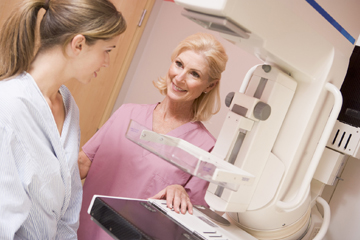
- Discuss any recent changes or problems in your breasts with your healthcare provider before getting the mammogram. Also discuss any medical history that could affect your breast cancer risk-such as surgery, hormone use, breast cancer in your family, or if you’ve had breast cancer before.
- If you have a choice, use a facility that specializes in mammograms and does many mammograms a day. Try to go to the same facility every time you want this test, as it is easy to compare your mammograms from year to year and get a proper idea of your condition.
- Taking an over-the-counter anti-inflammatory such as ibuprofen or acetaminophen before your mammogram can reduce discomfort. Talk to your physician about this first.
- If possible schedule your mammogram when your breasts are not tender or swollen (the week just before your period). This can reduce discomfort and also provide good pictures.
- On the day of exam, don’t use any deodorant, lotion, or antiperspirant on the upper part of the body, as it might result in unclear images.
- You would have to remove your top and bra for the mammogram. Wear a skirt or pants so that undressing above the waist is easy. The facility will give you a wrap to use.
- The whole procedure takes about 20 minutes and the actual breast compression lasts only a few seconds.
- Between your regular mammograms, do a self-exam at the end of each menstrual period. If you notice a change, you can be proactive about it.
- Consult with your physician to determine how often you should get a mammogram.
Most abnormalities found during a mammogram are not cancer. According to the American Cancer Society, about 1 in 10 women who have a mammogram will require an additional mammography or ultrasound screening to investigate any suspicions.